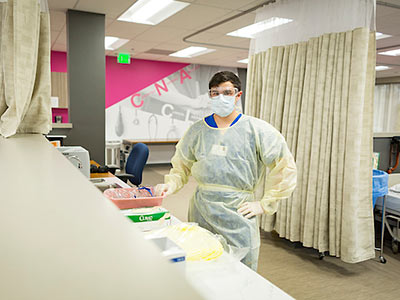Purpose and Policy
The purpose of this policy is to reduce the risk of student exposure to air and body substance pathogens such as, but not limited to, Covid 19, Hepatitis B Virus (HBV), Hepatitis C Virus (HBC), the Human Immunodeficiency Virus (HIV), SARS, and Tuberculosis.
Students are not to select, or care for, or be assigned to clients in respiratory isolation for either TB or SARS. Standard precautions is an approach to infection control that requires the application of blood and body fluid precautions for all patients and patient specimens regardless of diagnosis.
Standard precautions will be the minimum standard of practice throughout the TMCC CNA Program.
Methods of Compliance
Students must become familiar and comply with the TMCC Pathogen Exposure and Prevention Policy. Students must also become familiar and comply with the exposure plan of the clinical sites to which they are assigned.
Prevention of Blood Borne Pathogen Exposure
Students will be required to participate in a Blood Borne Pathogen Exposure Prevention and Control Class. The student must also have satisfactorily demonstrated skill in using protective equipment and procedures before receiving a patient care assignment.
Vaccines
Students will be required to have completed immunizations. Students may receive the vaccinations from their own private health care provider or from community clinics. In addition, students must document a history of chicken pox (varicella), a titer or proof of vaccination before clinical courses begin.
Student Acceptance of Clinical Assignment
Students who have received formal classroom instruction in blood borne pathogen exposure control and can satisfactorily demonstrate knowledge and skills requisite to such care are expected to accept clinical assignments. The decision to exempt a student from clinical experience will be made on a case-by-case basis by the faculty responsible for the clinical course.







